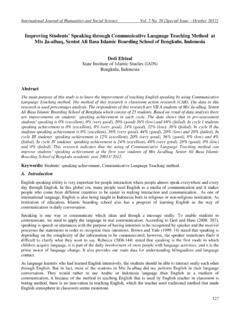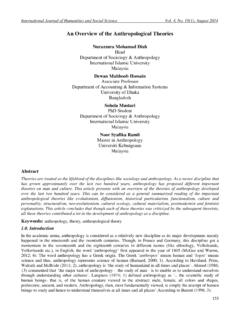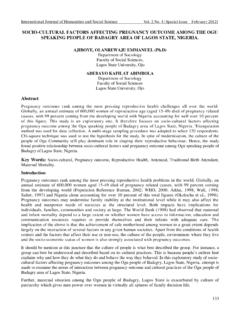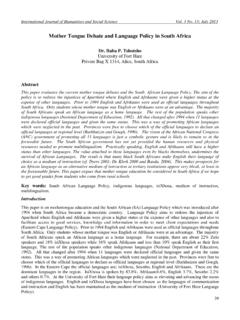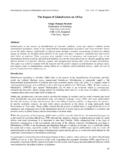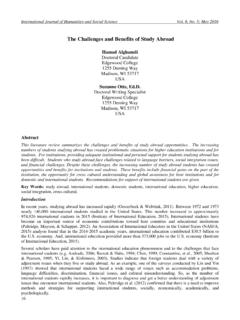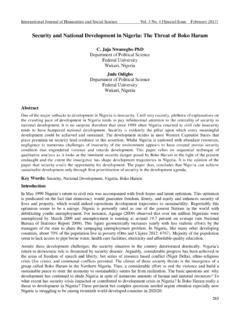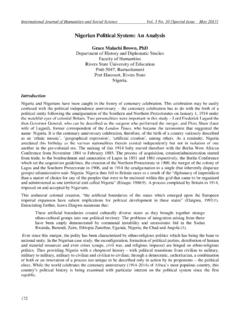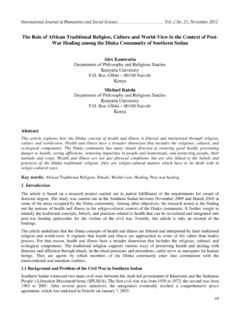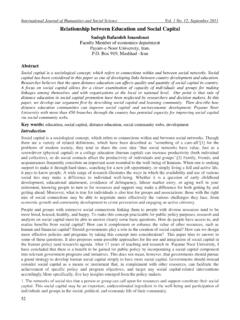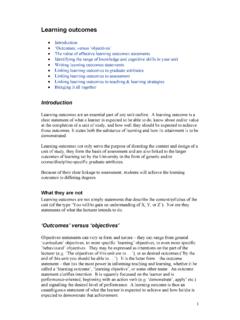Transcription of Constructivist Vs Traditional: Effective Instructional ...
1 International Journal of Humanities and Social Science Vol. 2 No. 5; March 2012. Constructivist Vs traditional : Effective Instructional Approach in Teacher Education Abida Khalid Assistant Professor University of Education, Bank Road Campus Lahore, Pakistan Muhammad Azeem Assessment Expert Punjab Education Assessment System (PEAS). University of Education, College Road, Township Lahore, Pakistan Abstract traditional approach is very common in teaching. It ignores the students and subjects need the context in which the training is progress the mental level of interest of the students. The emerging trends include the Constructivist which is moral and more focus on innovative activities and knowledge acquisition.
2 It seems more feasible to follow Constructivist approach for the teaching of English at level and Constructivist is more feasible in engaging the students in innovative and creative activities. The purpose of this study is to compare Instructional Module based on Constructivist approach with the traditional Method in teacher Education at Science college township campus, University of Education, Lahore. This study is delimited to teacher Education at Township campus, University of Education, Lahore due to research design, time and funding constraints. Experiment control groups were equal (32 each). Experiment group was teached with Constructivist approach by using a developed module.
3 Pre and post tests were used to see the difference in two groups. T-test was used to check the significant difference between experiment and control group after experiment. It is explored that both the groups were equal regarding their achievement scores in teaching of English communication before the experiment but after experiment both were different in their achievement. It is concluded that this significant performance of experiment group may be due to teaching student teachers of experimental group with Constructivist approach. Key Words: Instructional Approach, Constructivist and traditional Approach, Constructivist and traditional Learning Theories INTRODUCTION. traditional teaching approach (lecture method) is very common in education especially at university level.
4 traditional method ignores the students consequently the mental level of interest of the students. It involves coverage of the context and rote memorization on the part of the students. It did not involve students in creative thinking and participation in the creative part of activities. Most of the time, during teaching learning process, instruction remain unilateral which is and consider to be orthodox activity. The up-and-coming trends changed the present scenario and adopted the Constructivist approach which is moral and more focus on innovative activities and knowledge acquisition. It seems more feasible to follow Constructivist approach for the teaching of English at level and Constructivist is more feasible in engaging the students in innovative and creative activities.
5 A. module has been developed to confirm this effect. Basically constructivism is a theory of instruction based on observation to judge how people learn. Constructivism is a paradigm that hypothesizes learning as an active, contextualized, or constructive process. Constructivism is a reaction to teaching approaches such as behaviorism and programmed instruction. The learner acts as an information constructor. Learners construct knowledge based on their personal experiences and hypotheses of the environment. Learners actively construct or create their own subjective or objective reality. Learners, through social negotiation, continuously test their hypotheses and create new knowledge, correct previous knowledge, or confirm present knowledge.
6 Learner linked new knowledge to prior knowledge. Constructivists argued that learner is not a blank slate (tabula rasa) but brings past experiences and cultural factors to a construct new knowledge in given situation. 170. Centre for Promoting Ideas, USA Therefore each learner has a different interpretation and constructions of knowledge process based on mental representations (Learning Theories Knowledgebase, 2008). Constructivism activates the student's inborn curiosity about the real world to observe how things work. A common misunderstanding regarding constructivism, due to confusion of theory of pedagogy (teaching) with a theory of knowing, is that instructors should never tell students anything directly but, instead, should always allow them to construct knowledge for themselves.
7 Constructivism assumes that all knowledge is constructed from the learner's previous knowledge, regardless of how one is taught. Thus, even listening to a lecture involves active attempts to construct new knowledge. In the classroom, the Constructivist view of learning can point towards a number of different teaching practices. In the most general sense, it usually means encouraging students to use active techniques (experiments, real-world problem solving). to create more knowledge and then to reflect on and talk about what they are doing and how their understanding is changing. The teacher makes sure that he understands the students' preexisting conceptions, and guides the activity to address them and then build on them.
8 Constructivism modifies role of teacher that he facilitate and help students to construct knowledge rather than to reproduce a series of facts. The Constructivist teacher help the students through problem-solving and inquiry-based learning activities with which students formulate and test their ideas, draw conclusions and inferences, and pool and convey their knowledge in a collaborative learning environment. Constructivism transforms the student from a passive recipient of information to an active participant in the learning process. Always guided by the teacher, students construct their knowledge actively rather than just mechanically ingesting knowledge from the teacher or the textbook.
9 The task of the instructor is to translate information to be learned into a format appropriate to the learner's current state of understanding. Curriculum should be organized in a spiral manner so that the student continually builds upon what they have already learned. Bruner (1966) states that a constructivists or theory of instruction should address four major aspects: (1) predisposition towards learning, (2) the ways in which a body of knowledge can be structured so that it can be most readily grasped by the learner, (3) the most Effective sequences in which to present material, and (4) the nature and pacing of rewards and punishments. Statement of Problem The purpose of this study was to compare Instructional Module based on Constructivist approach with the traditional Method in teacher Education at Science College Township campus, University of Education, Lahore.
10 Objective of Study Following are the objectives of the study. To develop an Instructional module based on Constructivist approach To teach the students using Instructional module To compare the students achievement by teaching them through Constructivist and traditional approaches for teaching of English at BEd level To compare Instructional Module based on Constructivist approach with the traditional Method in teacher Education To determine the effectiveness of module based on Constructivist approach on the performance of students HYPOTHESES. There is no significant difference of scaled mean score of students of experimental and control group Ho1: There is no significant difference between control and experimental groups on pre-test of English communication at BEd.
